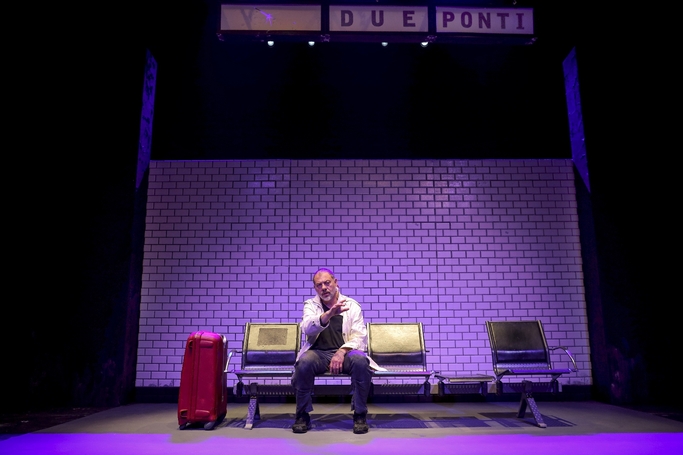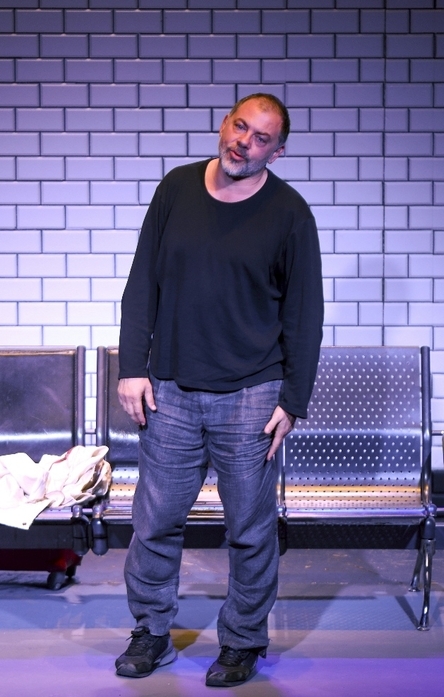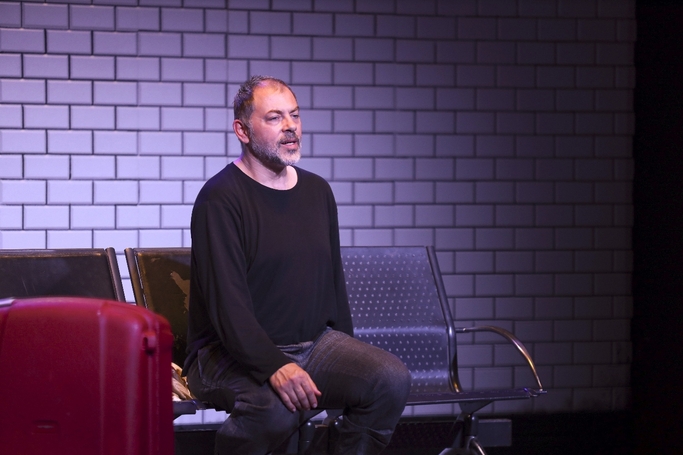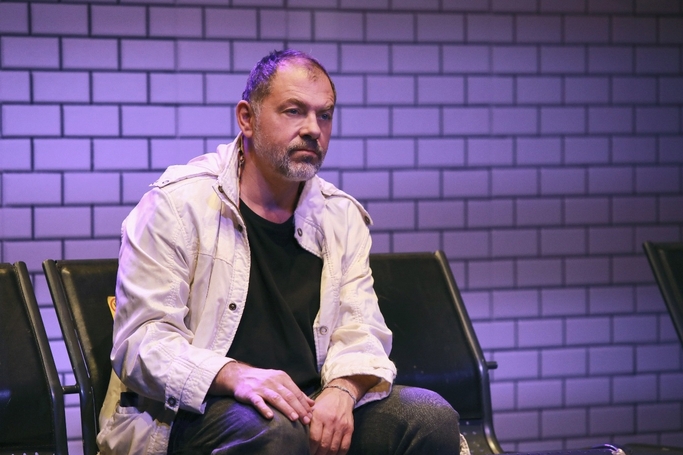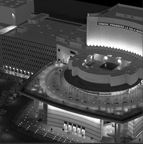Current Repertory
Zorro
by Margaret Mazzantini
Zorro
by Margaret Mazzantini
Premiere: 11.12.2022
Duration: 1 h 20 min / Pause: No
Performance presented as part of the Open Doors for All Program.
The text is translated and staged for the first time in Romania!
"Margaret Mazzantini is an Italian writer and actress, born in Dublin in 1961. After an award-winning career in theatre, film and television, Margaret Mazzantini has given up the stage in favour of writing. For her novel "Don't Move" (2002) she received the Strega Prize and the Grinzane Cavour Prize, Italy's most prestigious literary awards. Translated into 35 languages, the book immediately became an international bestseller, selling more than two million copies, and was screened by Sergio Castellitto, starring Penelope Cruz. She wrote the stage monologue "Zorro, a hermit on the sidewalk" in 2004 for her husband, actor and director Sergio Castellitto.
Following a traumatic event in his life, the main character of this monologue begins to reconsider the very meaning of his existence, becomes aware of the inconstancy of relationships between members of his family, rejects the superficiality of those around him and takes refuge in social exclusion, perceived as the only logical way to survive in a universe that seems to be built only on appearances. The character alternates between lyricism and realism, lyricism when he claims his difference with dignity and pride, realism when he evokes what he lacks most: love, empirical language thus becoming the means of expressing his despair, accentuating his loneliness.
The artists are often lucky bums. Who have managed not to spend the night under the open sky, but who carry with them the anxiety of wandering, they walk their gaze, they judge the world, they have obsessions, rituals. They are exposed every day to the risk of not finding their way back, of getting lost. What would our lives look like if, one day, without anyone having told us beforehand, without anything around us having given us the slightest sign, all the anchors that kept our life's ship tied to the shore were to disappear? What if all the landmarks on which we built our existence evaporated, what if all the things that gave meaning to our paths on the map no longer existed?
"Zorro helped me to uncover a fear we all have. Because within each of us, unacknowledged, masked, there is this extreme possibility: the sudden loss of the threads, the ballast that holds us anchored to the ordinary world. How many of us, on a night when our souls were gulping, sheltering under a portico, with the shutters up, have not felt towards that body, towards that pile of rags under which a body hides, the possibility of being ourselves in its place? Homeless people are wanderers who have escaped from our homes, who have the smell of our closets, the smell of what they don't have, but also of what we lack.
Because perhaps we are missing that walk in complete freedom and silence, that disconcerting, sometimes suspicious, but so natural, so necessary, walk that doesn't give a damn about the weather and the irreversible time of the clocks. How many of us have not felt the desire to collapse on the street, like a puppet, with our legs spread wide on the asphalt, our head leaning against the cushion of a wall? Let the river run its great and challenging course. To surface, to make peace with ourselves. A silent sliver of human flesh on the pavement of humanity. Because homeless people are like dogs, they look at you and you see your face looking back at them, but not the face you have, but maybe the one you had as a child or the one you sometimes have when you are stupid and sad.
That hungry, circled face you might have had if your slice of the world hadn't taken hold of you. Because every life contains at least one more." Margaret Mazzantini
Translated by Andreea Codrea-Boeriu
Foto Florin Ghioca
Buy tickets
*Accessing the "Buy tickets" button will redirect you to www.bilet.ro which will facilitate your tickets acquisition.
| The Painting Hall | 19:00 | Buy tickets |
"I bet that Ioan doesn't need a soundtrack. Of any kind. Well, if there's a phone call in the audience, if you can hear something from a foyer or another stage, that's something else. These are the noises of the theatre. These and the deep silence between the lines impeccably spoken form the sound of the theatre. You know I've never heard it before in the new NTB? I don't think we need the piano. Nor voices. Not even in Italian. Ioan Andrei Ionescu carries it all by himself. No worries, no emotions, I bet! *** Ioan pronounces somehow between Țzoro and Zoro. And there seems to be a hint of D. I tried in the title, but the truth is I don't know how to transcribe the way he pronounces the name. The dog's name. His name. The name he gets when he chooses the street. When he chooses the dog. I won't tell you any more. It would be a shame. And the first dog is Zoro, the second is Dzoro? I don't know, I'll have to see it again. And listen again. Listen to Ioan, the name of the dogs, the sound of the theater."
Mihai Brezeanu, Agenda Liternet - Dzoro. The sound of the theatre – Zorro
"Inspired by the actor Ioan Andrei Ionescu, "Zorro" is a fascinating one-man show, a quick and cold shower, like a summer rain fallen from the sky after the atmosphere has been charged with the energy of a daily life that it could no longer bear, in the hope that it would wash away the fears and sins, leave it with pure love so that it could wake up to life again the next day. To start all over again.
(...) Cleverly conducted by Ioan Andrei Ionescu, this stirring monologue brings to the fore the idea of fatality of which we are never aware. We always act as if we are entitled to everything and we never stop thanking ourselves for what we have. Without thinking that in an instant we can lose everything. Just like Zorro.
You almost don't know whether to yearn for the routine of your stability or to let yourself be carried away in the simple life of Zorro, reveling in the freedom of solitude, with all its threatening traps.
As Ioan Andrei Ionescu presents them to us, in a small voice, rarely threatening and seemingly never rebellious enough (I think the show's greatest asset), with precise gestures, full of truth, that accompany its clean and sincere speech, always relaxing in order to be able to speak responsibly with its self, not exaggerated, just naturally in order to convince you, so wise a peacekeeper, with the consolation already prepared as he applies it to you thoroughly, in a construct in which he perfectly integrates the recognizable (traumas related to family, love and betrayal, as well as common elements in social, individual and group behaviors and attitudes, in a succinct, essential inventory of perceptions)."
Luciana Antofi, Blog - An aimless Wanderer in his own life: Ioan Andrei Ionescu "Zorro", the vagabond of the National Theatre
"Featuring a fabulous actor, unfortunately too underrated over the last few years, Ioan Andrei Ionescu. A one-man show designed to remind us, for the umpteenth time, of how vulnerable we are. "Man is a thinking reed" Blaise Pascal once said. The philosopher was right, we are as fragile as we are strong. With an identity derived from a unique combination of qualities, flaws, emotions and cerebrality, humans have an amazing capacity to survive even the most unexpected trials. Bearing incredibly heavy burdens for years, a human being is capable of converting even the deepest sorrows into reasons for joy, and what does not break him down, makes him stronger.
(...) a performance as simple as it is impressive. A show of absolute silence, for yes, the underground is incredibly deep and free of worldly noises. A performance of the human voice, a voice that takes on unsuspected inflections when accompanied by an undeniable bodily expression. As huge as Ioan Andrei Ionescu appears (he has an impressive physique, let's face it), he becomes so small in the presence of his own tragedy. A dimensional play that derives directly from putting the accents right where they belong, and for this to take on value the director-actor tandem has worked hard."
Nona Rapotan, BookHub - Zorro, cavalerul singuratății absolute
"Margaret Mazzantini's "Zorro", directed by Toma Dănilă, performed by Ioan Andrei Ionescu, is the moving encounter between a text with soul and an actor willing to protect it, dressing it in his soul. It is not the actor who wears the mask of the character; Zorro, the one on the sheet, is wrapped, as it were, in Ioan Andrei Ionescu's personality; in his sincerity, in his not at all ostentatious expressiveness, in his convoluted but very fluent thoughts full of a truly touching humanity. The story of a misfortune, of a life derailed towards the "happiness" of accepting unhappiness, the story of a romantic, self-ironic, witty, philosophical and very lucid vagabond, a Zorro in a continuous duel with memories and a predisposition towards reverie with his eyes raised towards a sky that patiently reveals itself to him towards the revelation of the meaning of failure, this drama, whose corners we all find crumpled up in the pockets of our worn jackets, has found on the stage of the NTB's Pictură Hall its trenchant, mature, dignified and robust expression, in a staging without unnecessary complications".
Alina Epîngeac, Blog - „Zorro” – the fragility of the long-term actor
"Actor Ioan Andrei Ionescu is the undisputed star, who pleases the audience (especially the ladies), because he exudes masculinity, massiveness, strength, but also the poetry of those abandoned by luck and defeated in the bitter struggle of life. The star delivers clever lines, some memorable, full of a sweet romantic sap of the sadness of the man who has missed all the trains.
(...)Ioan Andrei Ionescu's performance is full of strength, emotion and intellectuality, coupled with a great sensitivity that is poured over the audience with beneficial effects. Forgetting the obsession with the bills, the sensitive audience vibrates emotionally to the text and participates in the drama of Zorro with many applauses at the end, in the wonderful Pictura Hall of the National Theatre."
Dinu Grigorescu, Rinocerul Magazine - A refined performance at NTB. Zorro by Margaret Mazzantini
„... The latest performance directed by Toma Danila, this time at the Pictura Hall of the National Theatre in Bucharest. The occasion for an exceptional one man show by actor Ioan Andrei Ionescu. A show about the frailties and vulnerabilities of apparently strong people. In whose existence, up to a certain point apparently ok or comme il faut, as the French say, something happens. And that something shows them first of all how lonely they are, how lonely they have been.
The play was translated by Toma Danila, he also adapted it, directed it and provided the production with a relatively discreet musical illustration. The importance of which, however, increases as we learn more about the sufferings of the confessor. We don't know his name, nor will we ever know it, before the event that changed everything. Who now goes by the name Zorro, like young Mario's dog. The Mario who died after a car accident. The car that was driven by the character who is now talking to us and to himself out loud. Who recalls his childhood, his marriage, the hell he lived in after the accident and after the masks of those around him, including his wife, fell off.
The great art of Ioan-Andrei Ionescu is that he does not fall into melodrama. He talks about fear, about love, about faith, he dialogues and asks God to be accountable with an admirable sense of proportion."
Mircea Morariu, HotNews - Breakage without healing (Zorro by Margaret Mazzantini)
"The text gives Ioan Andrei Ionescu a recital of exceptional quality in which he gives his full measure. It is a heavy, dense text, which requires all the actor's qualities, voice, technique, mastery of emotions. Ioan Andrei Ionescu's acting is extremely nuanced, cleverly alternating moments of emotional climax, some overwhelming, in which anger and frustration come to the surface, with calmer ones (this is obviously also the merit of the direction). The character oscillates between shrinkage, insecurity, vulnerability, on the one hand, and trenchant assertiveness of opinion on the other. The actor exploits his voice very well in a serious register, but with subtle shifts towards the warm, sweet zone - in moments of reminiscing about happy moments in his life before, about the beauty of his wife, or those of hope, because there is such a thing in an existence like his - alternating the hard expression of his face with the warm smile. Tension exists throughout the seventy-plus minutes in which the actor, shabbily dressed but not degraded, not repulsive, stands alone before the audience, aided by minimal set design and props...
The tension is contained, assumed, but never melodramatic: Ioan Andrei Ionescu's acting is kept on the fragile borderline between involvement and detachment, with great care for posture and gestures (measured, not at all excessive, betraying, like words, the weight of living, of moving forward).
A beautiful, accomplished, rounded performance; a lesson in acting."
Liviu Ornea, Liternet - A lesson in acting – Zorro
Translated by Andreea Codrea-Boeriu


